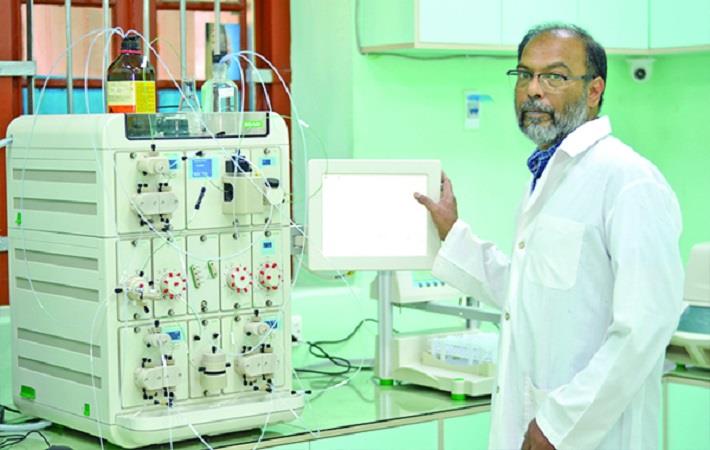Interviews
Bangladeshi scientists devise eco-friendly textile tech
03 Jan '19
3 min read

Courtesy: University of Rajsahi
Scientists at the Applied Chemistry and Engineering Department in Rajshahi University (RU) have developed an environment-friendly technology that can be used by Bangladesh’s textile industry. The technology will play a role in creating an environment-friendly apparel sector. The textile industry damages environment because its uses huge quantity of water.
The team was led by Dr. Mohammad Taufiq Alam.
In a study, Alam revealed that textile industry in the country consumes double the water used by the people of Dhaka city. The textile industry also pollutes the environment.
“We have invented a technology that is ‘eco-friendly’ or ‘environmentally friendly’. It will be less harmful for the environment and 45 per cent of water will be saved,” Alam said. Alam and his team had been working on the technology for the past four years.
The technology involves an “enzymatic method”. Enzyme is a protein molecule that works to increase the speed of production at any level.
“Once these proteins go into the environment they would be very useful both for the environment and fish. This is why it is ‘environment-friendly’. In this case, the quality of goods and prices will be taken care of,” Alam said and added that before the colouring of the clothes, a textile engineer’s first job is to remove the oil layer from the production line. For that, there is an enzyme for oil hydrolysis. Oil becomes fatty acid when it is hydrolysed. Fatty acids are very beneficial for animals and birds.
However, before the clothes are dried, the clothes have to be a little white. The device to measure the whiteness can be observed by researchers for a certain amount of time. Many researchers can carry such research work at 51.05 per cent to 51.75 per cent. “But, through our ‘Enzyme Activator’, we were able to go up to 90 per cent of the research work. Scientists think that this is the highest level achieved,” Alam said.
Regarding the weight of the cloth, Alam said, “If we lose less cellulose in clothing, the weight is also reduced. And in our ‘Enzymatic Method’, the weight of the clothes will be reduced. We hope the textile industries will be benefited from our technology.” He added, “Foreign buyers buy clothes from our textile industry by weight. Apart from this, many clothes have to be of light shades. If we do light shades, then the cloth gets a kind of yellowish look, which cannot be seen with naked eyes.”
As a result, foreign buyers do not want to take those clothes. “But if we use these enzymes (which is 90 per cent), then there would not be any yellowish tint in that cloth. In this case, they (the textile industries) will be benefited greatly,” he added.
Alam and his team have used the technology successfully in several textile factories of Bangladesh over the past few months. Apparel companies have expressed interest in testing the technology. (SV)
The team was led by Dr. Mohammad Taufiq Alam.
In a study, Alam revealed that textile industry in the country consumes double the water used by the people of Dhaka city. The textile industry also pollutes the environment.
“We have invented a technology that is ‘eco-friendly’ or ‘environmentally friendly’. It will be less harmful for the environment and 45 per cent of water will be saved,” Alam said. Alam and his team had been working on the technology for the past four years.
The technology involves an “enzymatic method”. Enzyme is a protein molecule that works to increase the speed of production at any level.
“Once these proteins go into the environment they would be very useful both for the environment and fish. This is why it is ‘environment-friendly’. In this case, the quality of goods and prices will be taken care of,” Alam said and added that before the colouring of the clothes, a textile engineer’s first job is to remove the oil layer from the production line. For that, there is an enzyme for oil hydrolysis. Oil becomes fatty acid when it is hydrolysed. Fatty acids are very beneficial for animals and birds.
However, before the clothes are dried, the clothes have to be a little white. The device to measure the whiteness can be observed by researchers for a certain amount of time. Many researchers can carry such research work at 51.05 per cent to 51.75 per cent. “But, through our ‘Enzyme Activator’, we were able to go up to 90 per cent of the research work. Scientists think that this is the highest level achieved,” Alam said.
Regarding the weight of the cloth, Alam said, “If we lose less cellulose in clothing, the weight is also reduced. And in our ‘Enzymatic Method’, the weight of the clothes will be reduced. We hope the textile industries will be benefited from our technology.” He added, “Foreign buyers buy clothes from our textile industry by weight. Apart from this, many clothes have to be of light shades. If we do light shades, then the cloth gets a kind of yellowish look, which cannot be seen with naked eyes.”
As a result, foreign buyers do not want to take those clothes. “But if we use these enzymes (which is 90 per cent), then there would not be any yellowish tint in that cloth. In this case, they (the textile industries) will be benefited greatly,” he added.
Alam and his team have used the technology successfully in several textile factories of Bangladesh over the past few months. Apparel companies have expressed interest in testing the technology. (SV)
Fibre2Fashion News Desk – India
Popular News
































-Ltd..jpg?tr=w-120,h-60,c-at_max,cm-pad_resize,bg-ffffff)





.jpg?tr=w-120,h-60,c-at_max,cm-pad_resize,bg-ffffff)
.jpg?tr=w-120,h-60,c-at_max,cm-pad_resize,bg-ffffff)






